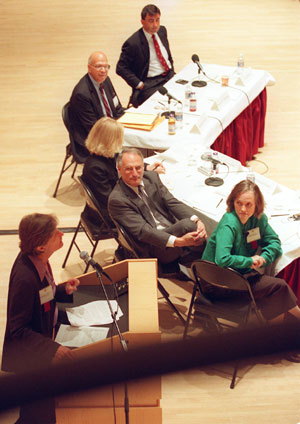Teaching or research? Students or consumers?
Role of money, technology in education eyed

Students as consumers, great researchers as inspiring teachers, and technology as anything but a magic bullet were some of the ideas discussed and argued Friday morning (Oct. 12) at “The Company of Educated Men and Women: Challenges for the 21st-Century Undergraduate Experience,” one of six faculty symposia held as part of the Inauguration of President Lawrence H. Summers.
Richard J. Light, Walter H. Gale Professor of Education at the Graduate School of Education (GSE), moderated the panel, which included Richard P. Chait, professor of higher education at the GSE; Eric Mazur, Harvard College Professor, Gordon McKay Professor of Applied Physics and professor of physics; and Dean of Undergraduate Education Susan G. Pedersen, who is also professor of history at Harvard. Bringing perspective from outside the University were Amy Gutmann, Princeton University provost, and Nannerl O. Keohane, president of Duke University and former president of Wellesley College.
Answers to Light’s opening question – What is the one element that has most altered the undergraduate landscape in the past decade? – established themes that resonated throughout the 90-minute discussion. The mind-set transformation to “students as consumers,” said Chait, is the biggest change on the recent landscape. For Keohane, it is information technology: “IT is the 800-pound gorilla,” she said.
“Students now seek not just relevancy from education, but also utility and choice,” Chait said. “The total experience matters almost as much or even more than the educational experience.” Liberal arts and values-based learning have gone out of vogue, he said, replaced by students’ and families’ demand for a return on their sizeable investment and for a varied menu of extras, from state-of-the-art weight rooms to high-speed Internet access. He described an “amenities arms race,” as colleges competed with each other to provide maid service and whirlpools.
Princeton’s Gutmann, whose daughter attends Harvard, contradicted this view, saying that “it sells our students short.” Such trends toward consumerism, she said, have been much slower at universities like Harvard, Duke, Princeton, or Yale. Rather, Gutmann said that dealing well with broad diversity – ethnic, geographical, cultural, economic, intellectual – is what distinguishes the 21st century campus. “We do our students a disservice if we don’t see that they are still here to grapple,” she said.
Consumerism is alive in higher education, particularly among parents, said Pedersen. But it’s not all bad if it encourages parents to call her with questions. “That’s actually quite a good thing. They keep us honest,” she said. Although she welcomes parents’ input and concerns, Pedersen says she often has to remind them that their sons and daughters have entered a partnership of learning, not an agreement to purchase a service. “You can’t bestow learning on someone. They have to want it,” she said.
The panel discussed the quality of teaching and learning, touching on grades, theses, and technology. Calling technology powerful but “not a magic bullet,” Keohane said students nonetheless demand it. “They expect that the campus will be not only wired but wireless,” she said. Harnessed by faculty, technology can save time and help them devote their resources to excellent teaching and research, she said.
Mazur, who admitted that “my pockets are loaded with technology,” argued that new technologies are simply new methods of delivering old content, just as the “new technology” of books was 200 years ago. Mazur generated laughter when he said that lectures were once described as a way of transferring the notes of the teacher into the notebooks of students without passing through the brains of either. “The problem is not the delivery of information, it’s the assimilation of information,” he said.
Panelists grappled with the tension between teaching and research in a lively discussion that offered a few concrete suggestions. Mazur, who was recently honored with a teaching award from the National Science Foundation, questioned the assumption that good teaching and good research are mutually exclusive. “I think that advancing knowledge and disseminating knowledge are complementary,” he said.
Several panelists suggested that placing a higher value on good teaching with the kind of rewards that good research brings is one potential resolution to the “dynamic tension,” as Keohane called it, between teaching and research. Keohane and Pedersen both noted that involving undergraduates in faculty research can be rewarding for both student and teacher.
Gutmann sounded an alarm for good teaching, saying that it is imperative for institutions like Harvard to demand high-quality teaching at all levels, particularly freshman seminars, which are typically not taught by senior faculty. Researchers should never be promised exemptions from teaching, she said, and universities need to ensure that researchers and graduate students are taught how to teach. “The more excellent teachers we have, the more we’ve done our job completely, not just in discovering information, but also in passing on the joy of discovery to our students,” she said.
Audience questions probed hot-button issues of grade inflation and core curriculum requirements. One member of the audience noted that the word “curriculum” had been absent from the panelists’ discussion, but that the subject was very much on the minds of undergraduates.
In closing, Light acknowledged the disagreements – entirely predictable, he said – and lively ideas of the panelists. In a final reflection on the panel, he said, “Aren’t our undergraduates unbelievably lucky to be exposed to people like this?”
Contact Beth Potier at beth_potier@harvard.edu




